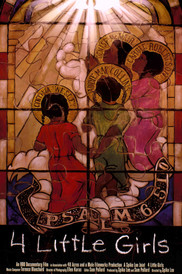
4 Little Girls is a remarkably clear-eyed telling of an incendiary tale — how four young black girls, ages 11 to 14, were killed in a 1963 bombing in Birmingham, Alabama.
I hesitate to compare 4 Little Girls to Schindler’s List, and yet it has that same quality of being a restrained, dignified recounting of an emotional incident. Spike Lee had been wanting to tell this story since before he became a noted filmmaker, and Lee brings all of his remarkable talents to bear. The movie is not flashy, just quietly gripping.
Lee frames the incident within the bigger picture of the Southern civil rights movement, particularly as it took place within an inflamed Birmingham. We see the town’s police commissioner, Bull Connor — described by one interviewee as “the dark spirit of Birmingham” — keeping order in town while driving a tank painted white, an image that is sure to bring gasps to those who aren’t familiar with the full story (which, I humbly admit, included me). And we see a repentant Gov. George Wallace, dragging a reluctant black colleague on camera so that Wallace can introduce him as “my best friend in the world.” (Notably, the “friend” looks quite unconvinced.)
It is that Wallace footage that might seem the most showy in a documentary otherwise bereft of editorializing. But it seems right to include the footage after seeing how the segregationist tactics of Wallace and others led indirectly to the deaths of Denise McNair, Carole Robertson, Addie Mae Collins, and Cynthia Wesley. Using little more than home movies and interviews with surviving family members, Lee brings the dead girls back to life and shows us that, when racial stereotypes are accepted and even honored, individual tragedies are the result.
Mostly, the story is told through simple, heartbreaking facts. Chris McNair tells us of the day he had to explain to his daughter Denise how she was taken by the aroma of a cooking hamburger at a lunch counter but could not eat there because she was black. And the film comes full circle by pointing out the inexplicable resurgence of black church bombings in the 1990’s.
Most of the victims’ relatives, understandably, become quite emotional on-camera. It can’t have been easy to reopen these old wounds, but 4 Little Girls makes you grateful that they endured their pain to do it. I only wish the movie had been up for Best Picture, as it is worth a dozen L.A. Confidential‘s.
